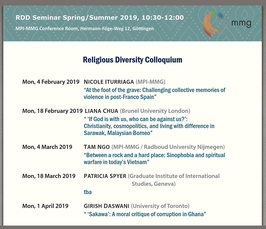"Perspectives on Philippine psychic surgery"
Religious Diversity Colloquium Spring/Summer 2019
- Date: May 20, 2019
- Time: 10:30 AM - 12:00 PM (Local Time Germany)
- Speaker: Deirdre de la Cruz (University of Michigan)
- Deirdre de la Cruz is Director of the Doctoral Program in Anthropology and History, and Associate Professor of History and Asian Languages and Cultures, at the University of Michigan. A cultural anthropologist by training, she is the author of the book Mother Figured: Marian Apparitions and the Making of a Filipino Universal (University of Chicago Press, 2015), and several articles on religion in the Philippines. Her current projects include a scholarly book on the history of faith healing in the Philippines, an edited volume on religious diversity in the Philippines, and two plays, one on the legacies of Filipinos who fought in WWII, and another that tells the history of Christianity through the eyes of its apostates.
- Location: MPI-MMG, Hermann-Föge-Weg 12, Göttingen
- Room: Conference Room

For more details please contact vdvoffice(at)mmg.mpg.de.
In the variegated landscape of the Filipino paranormal, one phenomenon
garnered worldwide attention in the last quarter of the twentieth
century: psychic surgery. A form of spiritual healing in which the
practitioner, or espiritista, usually male, operates on the body of the
patient without anaesthesia and using only his hands, psychic surgery
achieved particular renown in the United States in the 1980s when
celebrity practitioners of New Age spirituality like Shirley MacLaine
spoke publicly about their experience with Filipino psychic surgeons.
This paper first provides a broad historical outline of the esoteric
movements in the twentieth-century Philippines that culminated in the
convergence of New Age spirituality and Filipino Spiritism seen in
psychic surgery, paying particular attention to the axial shift from
Espiritismo (the science of communication with the dead codified by
French educator Allan Kardec that made its way to the Philippines at the
turn of the twentieth century), to transpacific New Age movements. It
then digs deep into the spectacle of healing that drew thousands of
patients from around the world at a time when the Philippines was in the
sway of the greatest cheat of all, Ferdinand Marcos.